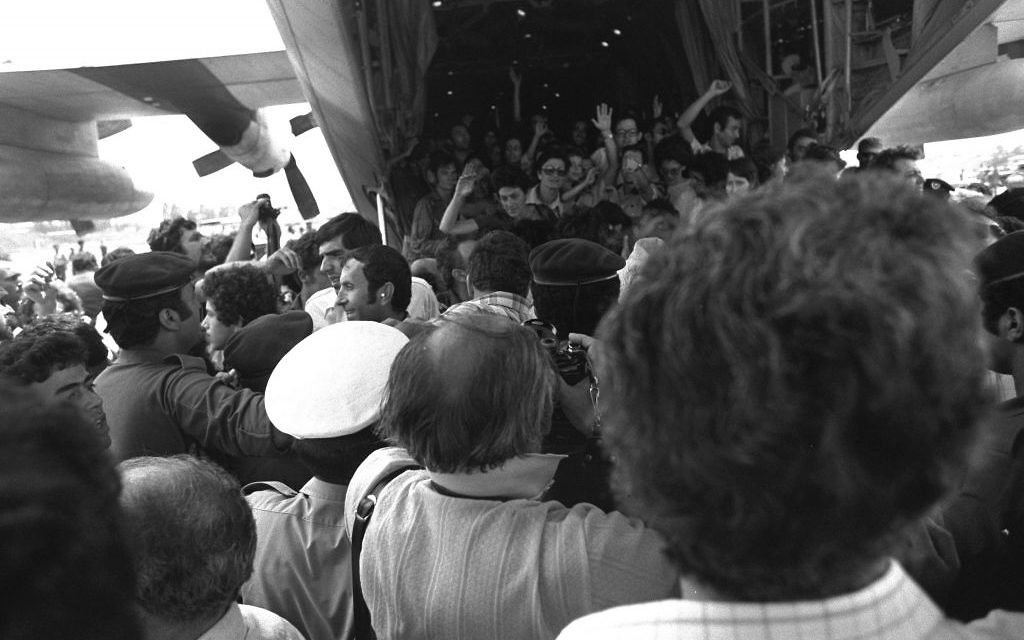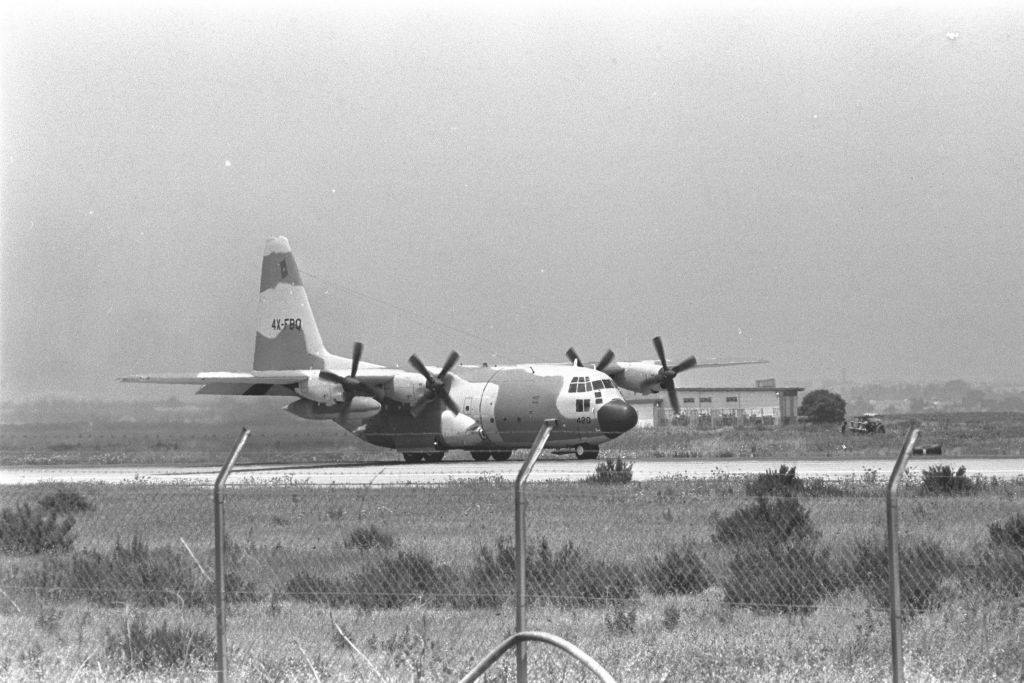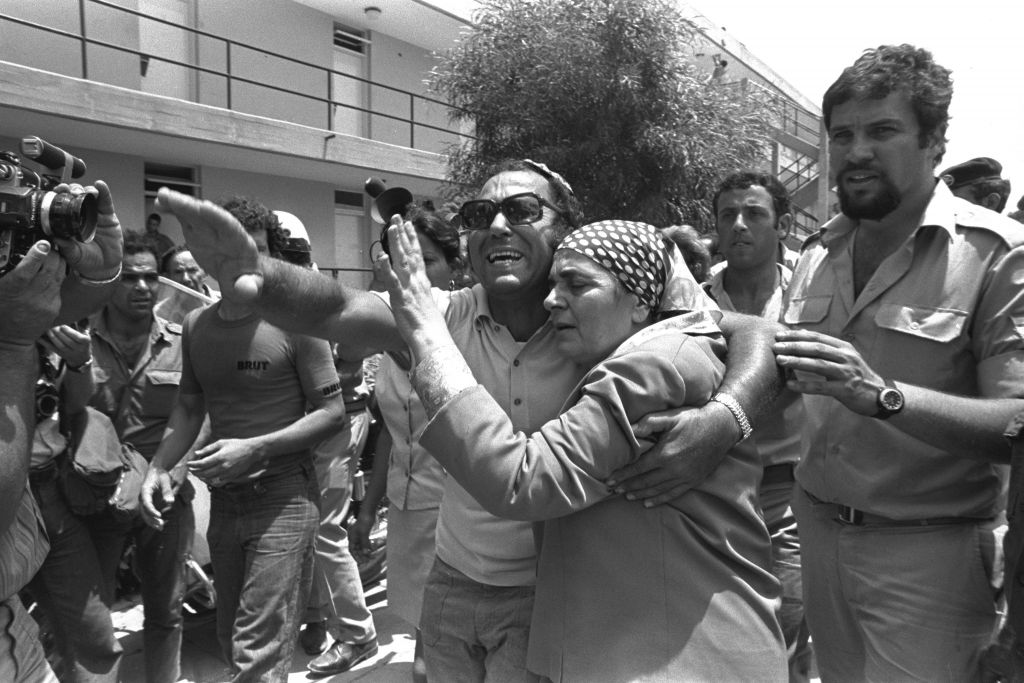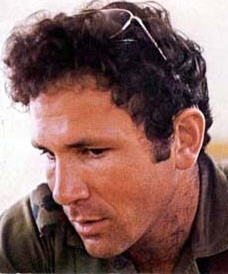40 years after Israel’s most daring mission
Jewish News speaks to former paratrooper Noam Tamir, one of the heroes of Israel’s audacious raid on Entebbe

After 40 years, Israel’s daring raid on Entebbe, Uganda, and its rescue of almost 100 hostages, has become the stuff of myth and legend. And that is not least because the only IDF soldier who died was Yoni Netanyahu, elder brother of the man who is today Israel’s prime minister, Benjamin Netanyahu.
But this year’s landmark anniversary has brought back all kinds of memories, some still very painful, for those who were in Entebbe on 4 July 1976. Among them is the former paratrooper Noam Tamir, today chief executive of a UK healthcare company, but then a 21-year-old kibbutznik and the youngest officer to take part in the Entebbe operation.
Tamir, who was born and brought up on Kibbutz Kfar Ruppin in the north of Israel, had a good start to his army career: after a battery of mental and physical tests he opted for one of the elite squads attached to the infantry brigade. Men from these three squads — Sayeret Golani (Tamir’s unit), Sayeret Matkal and Sayeret Tzanhanim — with their superior training (and, incidentally, better food than the rest of the army) — provided the 200-strong force sent to Entebbe.
Get The Jewish News Daily Edition by email and never miss our top stories Free Sign Up
On 27 June 1976, an Air France plane with 248 passengers was hijacked by two members of the Popular Front for the Liberation of Palestine (PFLP) and two members of the German Revolutionary Cells. The flight was en route to Paris from Tel Aviv, but was diverted first to Athens.
On board the flight was a young woman from Manchester, Patricia Martell, going home to sit shiva for her mother, Pearl Hyman. Desperate to make the shiva Mrs Martell, who had been married for just six weeks, and was a nurse, faked the symptoms of a miscarriage and the hijackers let her off the plane at Benghazi, in Libya, before it continued to Uganda. Mrs Martell’s debriefing by Mossad operatives in Benghazi saved many lives, says Noam Tamir, as she was able to tell the Israelis much about the hijackers.

But there was still much that they did not know. “We heard, vaguely, on the radio that there had been a hijacking,” recalled Noam Tamir, “but when on Thursday [1 July] we were told there was a mission for which we were needed, we didn’t know what we were going to do. Some buses came and took us to a base in the middle of the country where no one could get in or out, it was in lockdown.”
For two frantic days, while the Israeli cabinet argued internally about what to do, Tamir and his fellow soldiers did their best to simulate what they hoped to do when they got to Entebbe, using as a model “lines in the sand” to represent airport buildings. And “the first dress rehearsal”, remembers Tamir wryly, “didn’t go well at all.”
Prime Minister Yitzhak Rabin, who was initially against a military option, visited the closed base. Tamir, as an officer, was able to attend the planning meetings. “People ask, why were three squads sent to Entebbe, why not just one? The answer is, the risk was so high, if we were discovered en route by, for example, the Egyptians, we ran the risk of having an entire squad wiped out. This way we balanced things out.”
According to Professor Saul David, who last year published an authoritative account of the Entebbe operation, Rabin and his defence minister, Shimon Peres, should have been working together. “But these fierce political rivals spent that week – 27 June to 4 July 1976 – disagreeing on strategy. Rabin wanted to give in to the terrorists’ demands – the exchange of hostages for 40 Palestinian extremists – if there was no military option; Peres thought that would encourage more terror.
“Rabin gave in, and authorised the rescue after the terrorists’ extension of their deadline – from 1-4 July – gave Israeli military chiefs enough time to come up with a viable plan.”
Noam Tamir paints a terrifying picture of the Hercules plane in which he and the other Israeli soldiers made their outward journey. “We were obliged to fly so low that it was incredibly bumpy and we all vomited, every one of us.”
Every member of the team had been given a specific task. Tamir’s team was a back-up squad: “In case the first force [led by Yoni Netanyahu] did not manage to kill all the terrorists, we were to be the second wave, kill the hijackers and then evacuate the hostages into our plane, Hercules 4.”
To assist them, Tamir and Netanyahu were each given a new secret communications device. “I was to land and make contact with Yoni to see if they needed us or not.” But when Tamir tried to make contact, there was no answer, as Yoni Netanyahu had already been shot and injured by Ugandan troops.
At first Tamir’s team did not know what to do; there was shooting all around them and they were unsure whether to advance or not. “But we went in and started pulling the hostages out, helping them to walk and putting them on the plane”. Also on the plane was the fatally wounded Netanyahu, as doctors worked frantically to try to save him. There were other dead on the flight, too: three hostages, Jean-Jacques Mimouni, Pasco Cohen and Ida Borochovitch were killed in the cross-fire between the Israelis and Ugandan soldiers, Mimouni in particular because he stood up despite yells of “get down!” from Israeli rescuers.
After a nine-hour flight back to Israel Tamir and his crew were taken off the planes at a military airbase before the welcome arrival at Ben-Gurion for the hostages. And for 20 years, he says, they were prevented from talking about the details of this astonishing rescue operation.
Instead, they went straight back to training, as the echoes of the raid on Entebbe reverberated around the world.
Noam Tamir, who is a governor of the Hebrew University, will discuss the Entebbe operation on 13 July at a private event for the legacy section of the British Friends of the Hebrew University.

Thank you for helping to make Jewish News the leading source of news and opinion for the UK Jewish community. Today we're asking for your invaluable help to continue putting our community first in everything we do.
For as little as £5 a month you can help sustain the vital work we do in celebrating and standing up for Jewish life in Britain.
Jewish News holds our community together and keeps us connected. Like a synagogue, it’s where people turn to feel part of something bigger. It also proudly shows the rest of Britain the vibrancy and rich culture of modern Jewish life.
You can make a quick and easy one-off or monthly contribution of £5, £10, £20 or any other sum you’re comfortable with.
100% of your donation will help us continue celebrating our community, in all its dynamic diversity...
Engaging
Being a community platform means so much more than producing a newspaper and website. One of our proudest roles is media partnering with our invaluable charities to amplify the outstanding work they do to help us all.
Celebrating
There’s no shortage of oys in the world but Jewish News takes every opportunity to celebrate the joys too, through projects like Night of Heroes, 40 Under 40 and other compelling countdowns that make the community kvell with pride.
Pioneering
In the first collaboration between media outlets from different faiths, Jewish News worked with British Muslim TV and Church Times to produce a list of young activists leading the way on interfaith understanding.
Campaigning
Royal Mail issued a stamp honouring Holocaust hero Sir Nicholas Winton after a Jewish News campaign attracted more than 100,000 backers. Jewish Newsalso produces special editions of the paper highlighting pressing issues including mental health and Holocaust remembrance.
Easy access
In an age when news is readily accessible, Jewish News provides high-quality content free online and offline, removing any financial barriers to connecting people.
Voice of our community to wider society
The Jewish News team regularly appears on TV, radio and on the pages of the national press to comment on stories about the Jewish community. Easy access to the paper on the streets of London also means Jewish News provides an invaluable window into the community for the country at large.
We hope you agree all this is worth preserving.
-
By Brigit Grant
-
By Laurent Vaughan - Senior Associate (Bishop & Sewell Solicitors)
-
By Laurent Vaughan - Senior Associate (Bishop & Sewell Solicitors)
-
By Laurent Vaughan - Senior Associate (Bishop & Sewell Solicitors)
-
By Laurent Vaughan - Senior Associate (Bishop & Sewell Solicitors)























